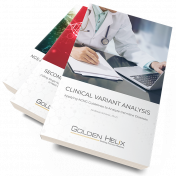Congenital Myasthenic Syndromes (CMS) History: Congenital Myasthenic Syndromes (CMS) are a group of rare hereditary conditions that can cause seizures, severe muscle weakness, respiratory problems, and potentially disabling weaknesses shortly after birth or early childhood (1). CMS is the result of abnormalities in acetylcholine proteins residing in the motor endplate of the neuromuscular junction (1). These abnormalities can be diagnosed… Read more »
When using VarSeq; annotations, application settings, and assessment catalogs are all stored locally. Sometimes these resources can grow to large space grabbing directories, causing you to either purchase additional storage devices or getting rid of previously downloaded resources you might need down the road. But there’s hope! You can set where you want all of your data stored to be… Read more »
Hypertrophic Cardiomyopathy History It was December 9th, 1989, when one of Loyola Marymount’s strongest inside players, Hank Gathers, collapsed during the middle of a collegiate level basketball game against UC Santa Barbara. Measuring in at 6’7” and weighing 210 pounds, Gathers was diagnosed with exercise-induced ventricular tachycardia, or in layman’s terms, an abnormal heartbeat. Even with the concerning nature of… Read more »
Clinical Variant Analysis for Cancer – Applying AMP Guidelines to Analyze Somatic Variants Detecting cancer at an early stage can make it much more treatable. Developing tests and making them clinically actionable is crucial to beat this disease. This eBook covers the state-of-the-art gene panel tests for cancer. Of course, there is more that can be done. The field is… Read more »
We are upgrading all VSClinical +Cancer Add-On purchases to a 15-months license! One license of VSClinical +AMP Guidelines – $17,995* Additional Users: $8,995* The individualized nature of tumors requires genomic testing for providing the best outcomes for patients. Next-Gen Sequencing enables the detection of small mutations, copy number changes, and common fusions affordably and with high precision. However, the interpretation… Read more »
Clinical Variant Analysis for Cancer – Applying AMP Guidelines to Analyze Somatic Variants As described in my eBook “Genetic Testing for Cancer,” any bioinformatic pipeline for cancer ultimately calls variants based on the aligned reads that the sequencer generated. Variant calling is the process of reviewing a sequence alignment, typically in the form of a BAM file, to identify loci… Read more »
Clinical Variant Analysis for Cancer – Applying AMP Guidelines to Analyze Somatic Variants Analogous to the ACMG guidelines for germline mutations, the Association for Molecular Pathologists (AMP) has issued guidelines to assess and report on somatic variants. The key paper in this area was published by Li et. al (2017) with the title “Standards and Guidelines for the Interpretation and… Read more »
Clinical Variant Analysis for Cancer – Applying AMP Guidelines to Analyze Somatic Variants Precision Medicine uses genetic information from individual patients. This may include the following areas: Diagnosis Treatment Prevention Specifically, in the cancer space, data derived from Next-Gen Sequencing (NGS) is used to diagnose and prognose diseases, select a targeted therapy and potentially evaluate the suitability of a patient… Read more »
Applying AMP Guidelines to Analyze Somatic Variants Today, I am thrilled to share with you the launch of a brand new eBook titled “Clinical Variant Analysis for Cancer – Applying AMP Guidelines to Analyze Somatic Variants”. We would happy to send you a complimentary copy which can be requested on our website here. The clinical utilization of Next-Gen Sequencing data… Read more »
Overview VSClinical enables users to evaluate variants according to the ACMG guidelines in a high-throughput fashion and obtain consistent results and accurate variant interpretations. This feature is tightly integrated into our VarSeq platform as well, and when paired together, users can evaluate NGS data and obtain clinical reports all in one suite. Coupled with the ability to find novel or… Read more »
VSClinical provides a rapid-fire way to investigate any variant’s impact by following the ACMG Guidelines process for classification. We will be demonstrating this by looking at interesting examples of rare disorders and showcasing some evaluation steps users may deploy in their analysis. Our first example in this blog series is for a patient who has an indifference to pain, while… Read more »
In the previous two articles, we explored the different steps of a clinical workflow. The first post covered the automated analysis that creates a VarSeq project. While the second post covered the interpretation steps and generation of a clinical report. These posts illustrated the ease with which these complex tasks can be carried out. Today we’ll dig a little bit… Read more »
In the previous blog post, we covered the automated steps to create a VarSeq project. Today we will examine the active analysis steps. These are the steps that require human interpretation to analyze the clinically relevant variants. A lab tech can take the first pass at the output in the generated VarSeq project. They can perform the quality control and… Read more »
Automating a clinical workflow creates a stable and repeatable clinical analysis. Automation reduces the potential to introduce human error, helps in regulatory compliance, and improves the precision of the clinical results. It is important to know that if you run a sample through your clinical pipeline, you are going to get the same results today as you will in 6… Read more »
Mark Trinder is our 2019 Abstract Competition 1st Place Winner. As we prepare for his upcoming webcast on April 10, 2019, we wanted to give our community a little bit of a background on him! Mark Trinder is an MD/Ph.D. student at the University of British Columbia, Canada working under the supervision of Dr. Liam Bruham. Mark’s research focuses on… Read more »
This year has been full of excitement for our team, and customers as well; we have a plethora of recently published articles citing Golden Helix! We would like to congratulate everyone on their success. Please enjoy these features articles, or see the full list here. SNP & Variation Suite Di Gerlando, R.; Mastrangelo, S.; Sardina, M.T.; Ragatzu, M.; Spaterna, A.;… Read more »
Examples of Clinical Variant Interpretation with VSClinical In this chapter, I’d like to go through a few examples for variants that have been classified with the help of VSClinical. This will give you a better understanding of how data sources are actually being represented in the software and how those are used to make decisions on applicable criteria. It goes… Read more »
Clinical Variant Analysis – Classification Criteria of Benign Variants The classification of benign variants is overall simpler and more straightforward, with the majority of benign variants being eliminated through allele frequency in various population catalogs. BA1 If a variant is common in one or more population catalog, as indicated by the allele frequency associated by the appropriate sub-population, it can… Read more »
We would like to thank everyone who entered our 2019 Abstract Competition. This event is an excellent opportunity for our team to hear the unique ways Golden Helix software is being applied around the world. We had a number of remarkable entries this year which made our selection process a daunting one, indeed. It is my pleasure to announce this… Read more »
Clinical Variant Analysis – Applying ACMG Guidelines to Analyze Germline Diseases The clinical interpretation of genetic variants is time-consuming and requires strict attention to detail. Clinicians must thoroughly review any variants that could potentially cause disease using a complex set of guidelines. There are guidelines for the interpretation of variants relating to hereditary risk, germline diagnostics issued by the American… Read more »








